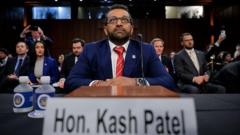What Were the Key Takeaways from Kash Patel's Combative Senate Hearing?

Published: 2025-09-16 20:10:24 | Category: wales
FBI Director Kash Patel faced intense scrutiny during his testimony before the Senate Judiciary Committee regarding his handling of the investigation into the assassination of conservative youth leader Charlie Kirk in Utah. Patel defended his actions against accusations of politicisation and incompetence, revealing new details about the case and the FBI's broader operations. His testimony was marked by contentious exchanges, particularly with Democratic senators, highlighting the ongoing political tensions surrounding the FBI's investigations.
Last updated: 27 October 2023 (BST)
- Kash Patel defended his handling of the Charlie Kirk assassination investigation.
- He clashed with Democratic senators over accusations of incompetence.
- Patel revealed plans for increased federal resource deployment in crime-ridden cities.
- He described ongoing investigations into the Kirk case and related suspects.
- Patel's testimony reflects significant political tensions in the FBI's operations.
Background on the Investigation
The tragic assassination of Charlie Kirk has raised numerous questions about the FBI's efficacy and its political neutrality. Kirk, a prominent conservative figure, was killed in Utah, prompting an urgent investigation. Patel's leadership of the bureau during this time has become a focal point for criticism, particularly from Democrats who argue that the FBI's actions have been politicised.
Key Testimony Highlights
During the Senate Judiciary Committee hearing, Patel made several notable statements regarding the investigation, his interactions with the public, and the FBI's overall mission. Here are some key aspects of his testimony:
Defending Against Accusations
Patel's testimony lasted over three hours, during which he encountered repeated accusations of mishandling the Kirk investigation. He dismissed these claims, asserting that the FBI had acted transparently. He stated that the suspect in the assassination was apprehended shortly after the release of new surveillance images, emphasising the importance of public cooperation in such investigations.
Contentious Exchanges with Senators
Patel's exchanges with Democratic senators, particularly Dick Durbin and Adam Schiff, were marked by tension. Durbin characterised Patel as the "most partisan FBI director ever," while Schiff confronted him regarding the Epstein case, leading to an explosive verbal clash where Patel labelled Schiff a "political buffoon." These confrontations underscore the deepening partisan divide affecting the FBI's operations.
Broader Implications
The implications of Patel's testimony extend beyond the Kirk investigation. His remarks about potential federal deployments to cities suffering from high crime rates align with the Trump administration's focus on law enforcement. Patel suggested that several cities could receive federal resources, including Chicago, Miami, and St. Louis, indicating a possible escalation of federal intervention in urban crime management.
Upcoming Federal Resource Deployment
Patel’s mention of potential deployments reflects a broader strategy by the Trump administration to respond to crime in urban areas. Earlier this year, National Guard troops were sent to Washington DC and Memphis, Tennessee, raising legal and ethical questions about the militarisation of domestic law enforcement. Legal experts have expressed concerns regarding the legality of deploying troops in cities, particularly in light of a recent federal ruling that deemed such actions illegal in Los Angeles.
Political Ramifications
Patel's testimony and the surrounding controversy have significant political ramifications. The criticism from Democrats and even some within the Trump administration suggests growing unrest regarding the FBI's direction under Patel's leadership. As investigations continue, the political landscape may shift, particularly if public opinion sways against the administration's current strategies.
Conclusion
As the investigation into Charlie Kirk's assassination unfolds, the scrutiny on Kash Patel and the FBI will likely intensify. Patel's combative stance during his testimony indicates that he is prepared to fight back against accusations, but the effectiveness of his leadership remains in question. As federal resources potentially expand into more cities, the balance between safety and civil liberties will be a critical issue for lawmakers and citizens alike.
What does this mean for the future of the FBI and its relationship with the public? The unfolding events may redefine the agency's approach to crime and its perceived impartiality in politically charged cases. #FBI #KashPatel #CharlieKirk
FAQs
What prompted Kash Patel's testimony before the Senate Judiciary Committee?
Kash Patel testified in response to scrutiny over his handling of the investigation into Charlie Kirk's assassination and accusations of politicisation within the FBI.
What were the main accusations against Kash Patel during the hearing?
Democratic senators accused Patel of incompetence and politicisation, claiming the FBI mishandled the Kirk investigation, particularly regarding inaccurate information released to the public.
What did Patel reveal about federal deployments to cities?
Patel suggested that cities like Chicago, Miami, and St. Louis might see increased federal resources as part of a broader strategy to combat urban crime.
How did Patel respond to accusations from Democratic senators?
Patel defended his actions vigorously, often clashing with senators and dismissing their criticisms as partisan attacks, particularly targeting Senator Adam Schiff with harsh remarks.
What are the legal implications of deploying National Guard troops in cities?
Legal experts have raised concerns about the legality of using military troops for law enforcement in domestic areas, especially following a federal ruling that deemed such deployments illegal in Los Angeles.



